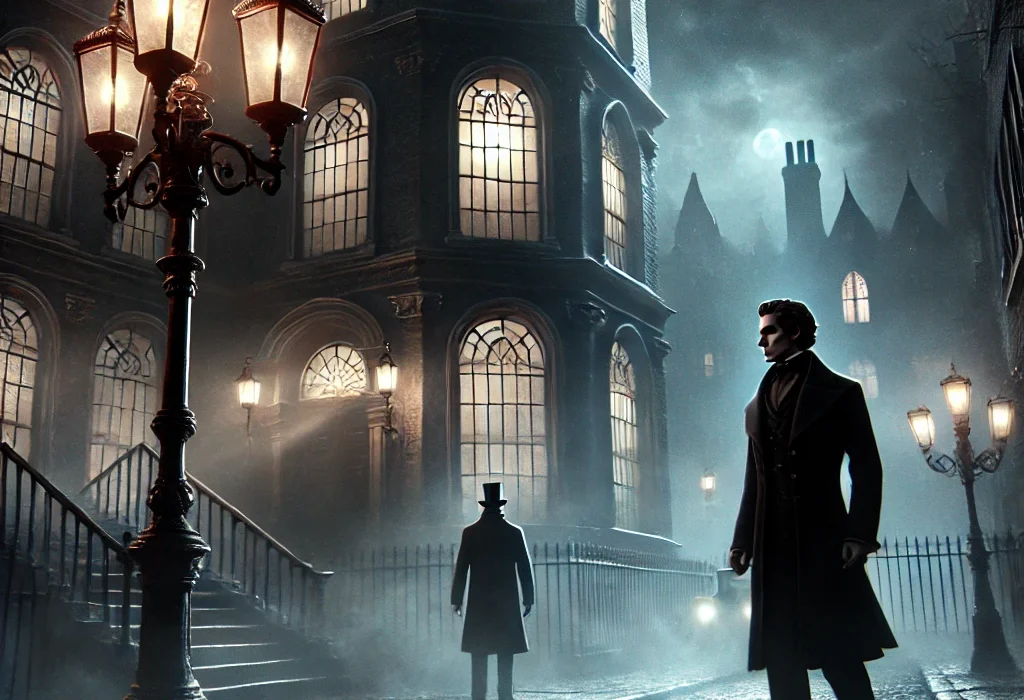“Strange Case of Dr. Jekyll and Mr. Hyde” is a novella by Robert Louis Stevenson, published in 1886. The story explores the duality of human nature, encapsulating themes of good versus evil within a single individual. Set against the backdrop of Victorian London, the narrative delves into the life of Dr. Henry Jekyll, a respected scientist, and his darker counterpart, Mr. Edward Hyde. This tale of transformation and moral conflict has cemented its place as a classic in horror and psychological fiction.
Comprehensive Plot Summary
Mr. Gabriel John Utterson, a lawyer with a reputation for discretion and a deeply ingrained sense of duty, leads a life of quiet routine in Victorian London. His placid existence is disrupted when his cousin, Mr. Richard Enfield, recounts a disturbing encounter during one of their Sunday walks. Enfield tells of a sinister figure named Edward Hyde, who, in the early hours of the morning, trampled over a young girl with a chilling lack of remorse. The incident was settled when Hyde, with an unsettling calmness, paid off the girl’s family with a cheque signed by the respectable Dr. Henry Jekyll, a prominent scientist and a dear friend of Utterson.
This bizarre connection between Jekyll and Hyde troubles Utterson, especially since Jekyll’s will, which Utterson holds, inexplicably stipulates that in the event of Jekyll’s death or disappearance, all his possessions should pass to Hyde. Driven by concern, Utterson begins to investigate. He seeks out Hyde, meeting him in a dark alley where Hyde’s presence evokes a sense of innate evil and deformity. Despite Utterson’s apprehensions, Jekyll reassures him that he can be rid of Hyde whenever he chooses, though the strain in Jekyll’s demeanor suggests a deeper conflict.
London is soon shaken by a horrific crime. Sir Danvers Carew, a beloved and respected member of society, is brutally murdered, his body found bludgeoned with a cane. A maid, the sole witness, identifies the assailant as Hyde. Utterson recognizes the broken cane as one he had given to Jekyll, confirming his worst fears. He confronts Jekyll, who appears gravely ill and distressed but swears he will never see Hyde again. Jekyll shows Utterson a letter from Hyde, indicating he has means of escape and will not trouble Jekyll further. Though somewhat reassured, Utterson remains wary.
As time passes, Hyde seems to vanish, and Jekyll reclaims his former sociability, engaging with friends and resuming his charitable activities. However, this period of peace is short-lived. One evening, Poole, Jekyll’s loyal butler, visits Utterson, deeply agitated. He reveals that Jekyll has locked himself in his laboratory for days, and strange occurrences have made him fear for his master’s safety. Utterson and Poole break into the lab, where they find Hyde’s lifeless body, dressed in Jekyll’s clothes, and a suicide note. Jekyll is nowhere to be found.
Among the scattered papers, Utterson finds a detailed confession from Dr. Jekyll, revealing the horrifying truth of his dual existence. Jekyll, driven by a desire to separate his good and evil natures, created a potion that transformed him into Edward Hyde, allowing him to indulge in his darker impulses without tarnishing his own name. Initially, Jekyll reveled in the freedom Hyde provided, but gradually, Hyde grew more powerful and uncontrollable. The transformations began occurring spontaneously, even without the potion, leaving Jekyll increasingly helpless.
Jekyll describes the initial thrill and subsequent horror of becoming Hyde. He relished the uninhibited life Hyde led, indulging in vices and committing acts he would never dare as Jekyll. However, as Hyde’s actions grew more heinous, Jekyll was filled with dread and revulsion. The murder of Sir Danvers Carew was a turning point, shocking Jekyll into attempting to cease his transformations. Despite his efforts, Hyde emerged stronger, and Jekyll feared permanent subsumption.
Desperate and isolated, Jekyll confesses to the gradual loss of control. Hyde’s presence becomes a constant threat, appearing without warning and committing increasingly violent acts. The inner struggle intensifies, with Jekyll’s willpower eroding as Hyde’s influence grows. The final act of defiance against Hyde’s dominance leads to Jekyll’s realization that he cannot continue living under such torment. Rather than allow Hyde to fully consume him, Jekyll chooses to end his life.
Utterson and Poole piece together the tragic downfall of Dr. Jekyll, understanding the magnitude of his internal battle and the catastrophic consequences of his experiment. Jekyll’s confession lays bare the duality of human nature, the struggle between good and evil, and the perils of tampering with the natural order. His attempt to compartmentalize his darker impulses ultimately led to his undoing, with Hyde’s evil consuming him entirely.
The narrative concludes with Utterson and Poole reflecting on the profound lessons learned from Jekyll’s fate. The once esteemed doctor, in his quest to purify his nature, fell victim to the very darkness he sought to control. Hyde’s malevolence devoured Jekyll, underscoring the inherent danger in attempting to separate the intertwined aspects of humanity. The tragic tale of Dr. Jekyll and Mr. Hyde serves as a cautionary reflection on the complexities of the human psyche and the inherent risks of unchecked scientific ambition.
Main Characters
- Dr. Henry Jekyll: A respected doctor and scientist who creates a potion to separate his good and evil natures, leading to his transformation into Mr. Hyde.
- Mr. Edward Hyde: The evil alter ego of Dr. Jekyll, who indulges in vile and violent acts without remorse.
- Mr. Gabriel John Utterson: A lawyer and close friend of Dr. Jekyll, who investigates the mysterious connection between Jekyll and Hyde.
- Mr. Richard Enfield: Utterson’s cousin, who first tells the story of Hyde’s trampling of the girl.
- Dr. Hastie Lanyon: A friend of both Utterson and Jekyll, who becomes estranged from Jekyll due to his unorthodox experiments.
- Mr. Poole: Dr. Jekyll’s loyal butler, who grows increasingly concerned about his master’s strange behavior.
Themes and Motifs
- Duality of Human Nature: The central theme is the duality within humans, represented by Jekyll and Hyde, illustrating the struggle between good and evil.
- Science and Ethics: The story explores the ethical limits of scientific experimentation and the consequences of overreaching ambition.
- Reputation and Secrecy: The Victorian concern with reputation and the lengths individuals go to maintain appearances is a critical theme, with Jekyll hiding his darker side to protect his social standing.
- Inner Conflict: Jekyll’s internal battle between his virtuous self and his darker impulses highlights the human condition’s complexity.
Writing Style and Tone
Stevenson’s writing style in “Strange Case of Dr. Jekyll and Mr. Hyde” is characterized by its concise and controlled prose, which adds to the story’s tension and suspense. His use of descriptive language vividly brings the foggy, gloomy streets of Victorian London to life, enhancing the gothic atmosphere of the novella. Stevenson employs a third-person narrative interspersed with first-person accounts through letters and documents, which adds layers of mystery and depth to the story.
The tone of the novella is dark and foreboding, reflecting the inner turmoil of Dr. Jekyll and the creeping dread that Mr. Hyde represents. Stevenson’s language captures the horror and fascination of the dual nature of man, creating a chilling and thought-provoking narrative that delves into the darkest corners of the human psyche.
If this summary has sparked your interest, we would appreciate you subscribing to our newsletter.
There’s a treasure trove of other fascinating book summaries waiting for you. Check out our collection of stories that inspire, thrill, and provoke thought, just like this one by clicking here.
If you want to request a book summary, click here.
When Saurabh is not working/watching movies/reading books/traveling, you can reach him via Twitter/X, or LinkedIn.
Restart reading!






